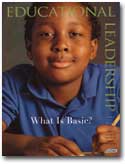It was Juan Carlos who first prompted me to confront the question of what is basic—and just—in education. The gentle 13-year-old in my English-as-a-second-language classroom not only struggled to acquire English—he was barely literate in Spanish. Throughout his early years in El Salvador, school had been an occasional luxury amidst the violence.
As a novice teacher who had taken only two courses in reading methodology, I was scarcely prepared for the instructional challenge Juan Carlos presented. And my middle school had not yet allocated the resources to teach him to read in his first language (p. 62). Juan Carlos taught me what —al literacy really means. Until he could become a fluent reader, whole universes would be closed to him. Even worse, the inability to write well denied others the opportunity to read his story.
Working with Juan Carlos, I recalled my own early experiences with print. I was already an avid reader when I entered 1st grade in Bethlehem, Pennsylvania. Yet, like Juan Carlos, I was required to learn a strange alphabet. In my case, it was the Initial Teaching Alphabet (ITA), a written system in which each sound in English has a distinct corresponding symbol. My parents still have the unusual ITA books they purchased for me that year, along with the stories I wrote in this research-generated script.
ITA was a short-lived experiment in the turbulent history of reading instruction. The literacy crisis continues to fuel tense debates—and bold initiatives. Indeed, the Learning First Alliance, a new coalition of leading education organizations (p. 95), has chosen to dedicate its energies to the twin goals of enabling all children to become skillful in reading and mathematics.
For educators today, considering What is basic? generates additional questions. Which children learn to read best through which instructional approaches at which developmental stages? Dorothy S. Strickland cuts through the polemic over whole language and phonics to offer a whole-part-whole framework for teaching students how to read (p. 6). And G. Reid Lyon makes the case for instruction that emphasizes phoneme awareness in a literature-rich environment (p. 14). Four other classroom perspectives (pp. 11, 19, 23, and 27) round out the discussion.
As the gateway to academic learning, reading well is a survival skill in our information-driven society. But how do we measure student achievement in this critical area? In this issue, we offer contrasting views of the Clinton administration proposal for voluntary national tests in reading and mathematics (pp. 42 and 45).
What conditions enable students to acquire essential skills at high levels? Lawrence J. Schweinhart and David P. Weikart highlight how early childhood curriculum approaches make a long-term difference (p. 57). And Jeannie Oakes and Amy Stuart Wells consider the promise of detracking (p. 38) once youngsters enter K–12 schools.
Beyond reading, what is basic for today's learners? Recognizing that the media play a defining cultural role, a program in Australia places media studies on the short list of essential skills (p. 78). In Japanese elementary schools, the emphasis is on connection, character, and content (p. 32). In Malawi, students prepare to participate in an emerging democracy (p. 83). And in Israel, some learners consider life-changing ethical dilemmas (p. 80).
Few educators have considered the essence of education with greater passion than the late Paulo Freire, who recognized literacy for its power to emancipate oppressed people. His words remind us: Reading does not consist merely of decoding the written word or language; rather it is preceded by and intertwined with knowledge of the world. Language and reality are dynamically interconnected. For Juan Carlos and all our students, learning the basics—however we define them—is not merely a matter of acquiring our words, but of reading, and redefining, our world.
